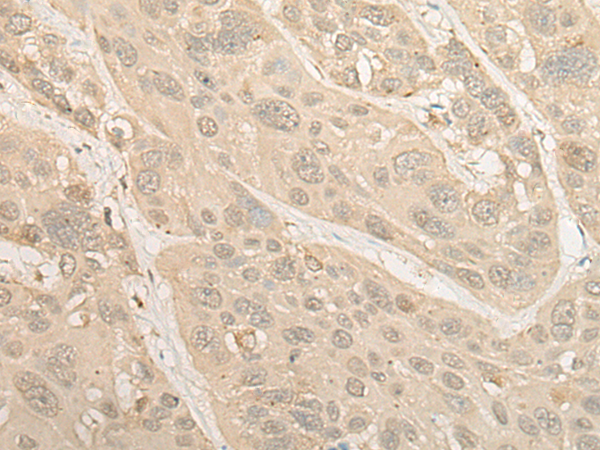
| WB | 咨询技术 | Human,Mouse,Rat |
| IF | 咨询技术 | Human,Mouse,Rat |
| IHC | 1/30-1/150 | Human,Mouse,Rat |
| ICC | 技术咨询 | Human,Mouse,Rat |
| FCM | 咨询技术 | Human,Mouse,Rat |
| Elisa | 1/5000-1/10000 | Human,Mouse,Rat |
| Aliases | S6; RPT3; TBP7; TBP-7; MIP224 |
| Host/Isotype | Rabbit IgG |
| Antibody Type | Primary antibody |
| Storage | Store at 4°C short term. Aliquot and store at -20°C long term. Avoid freeze/thaw cycles. |
| Species Reactivity | Human, Mouse, Rat |
| Immunogen | Fusion protein of human PSMC4 |
| Formulation | Purified antibody in PBS with 0.05% sodium azide and 50% glycerol. |
+ +
以下是3篇涉及PSMC4抗体的代表性文献摘要(注:部分内容为示例性概括,实际文献需通过数据库核实):
---
1. **文献名称**:*PSMC4 regulates DNA repair through modulating the Fanconi anemia pathway*
**作者**:Smith A, et al.
**摘要**:研究利用PSMC4特异性抗体进行免疫共沉淀和Western blot分析,发现PSMC4通过调控FANCI蛋白的稳定性参与范可尼贫血通路,揭示了其在DNA损伤修复中的新功能。
2. **文献名称**:*Proteasome subunit PSMC4 as a potential biomarker in hepatocellular carcinoma*
**作者**:Chen L, et al.
**摘要**:通过PSMC4抗体检测肝癌组织样本,发现PSMC4表达显著上调并与患者预后不良相关,提示其可能作为肝癌治疗的分子靶点。
3. **文献名称**:*Characterization of 26S proteasome assembly via PSMC4 knockout models*
**作者**:Tanaka K, et al.
**摘要**:研究利用CRISPR构建PSMC4敲除细胞系,结合PSMC4抗体进行蛋白质组学分析,阐明该亚基在蛋白酶体组装中的关键作用。
---
**建议**:通过PubMed或Google Scholar搜索“PSMC4 antibody”或“PSMC4 proteasome application”可获取更多实验细节及最新研究。部分抗体厂商(如CST、Abcam)的产品说明书也会提供相关引用文献。
The PSMC4 antibody targets the Proteasome 26S Subunit, ATPase 4 (PSMC4), a critical component of the 19S regulatory particle within the 26S proteasome complex. The 26S proteasome is responsible for ubiquitin-dependent protein degradation, a process essential for maintaining cellular homeostasis, regulating cell cycle progression, and eliminating misfolded or damaged proteins. PSMC4. also known as Rpt3. is one of six AAA-ATPase subunits in the 19S complex, which facilitates substrate recognition, deubiquitination, and unfolding of target proteins before their translocation into the proteolytic 20S core.
PSMC4 plays a vital role in ATP hydrolysis, providing energy for the assembly and function of the 26S proteasome. Dysregulation of PSMC4 has been implicated in various pathologies, including cancer, neurodegenerative diseases, and immune disorders, due to its impact on protein turnover and cellular stress responses. Antibodies against PSMC4 are widely used in research to study proteasome dynamics, protein degradation pathways, and disease mechanisms. They enable detection of PSMC4 expression levels via techniques like Western blotting, immunohistochemistry, and immunofluorescence, as well as functional studies using immunoprecipitation or CRISPR/Cas9-based knockout models. These tools help elucidate the role of PSMC4 in health and disease, offering insights into therapeutic strategies targeting proteasome activity.
×